Discover five remarkable natural musk alternatives that'll transform your fragrance creations. You can explore the powdery warmth of ambrette seeds, the earthy depth of angelica root, and the balsamic richness of labdanum. The rare costus root brings ancient mystique, while musk mallow offers a gentle botanical essence. These sustainable ingredients reveal complex scent profiles while protecting endangered species – and there's so much more to uncover about their unique characteristics.
Ambrette Seeds: Nature's Powdery Musk Secret
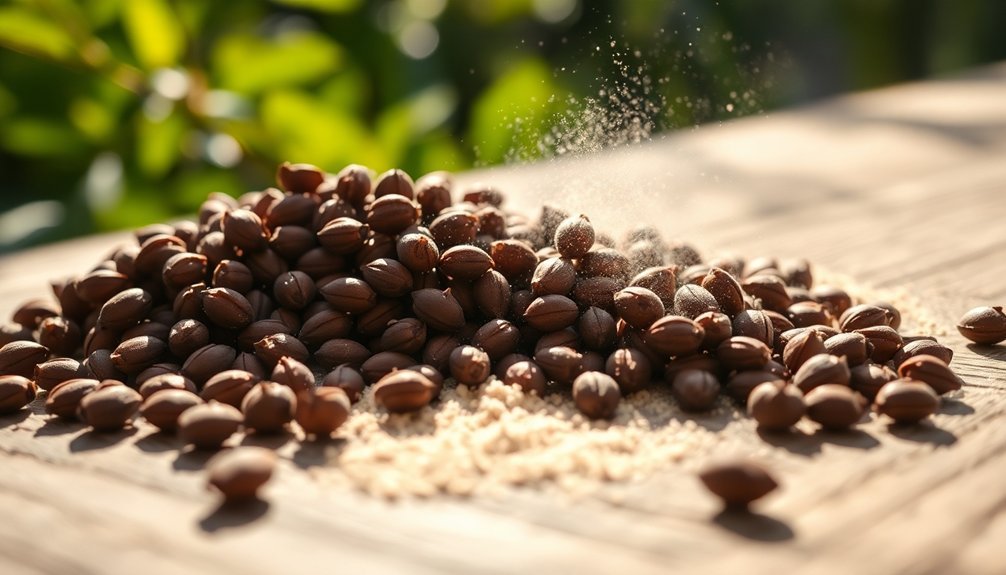
Treasured for centuries, ambrette seeds from the Abelmoschus moschatus plant offer one of nature's most remarkable musk substitutes. You'll find these precious seeds within brown capsules of this tropical hibiscus family member, which grows up to 3.5 meters tall and produces striking yellow flowers.
When you experience ambrette's complex aroma, you'll detect a warm, musky fragrance with hints of peanuts, tobacco, and leather. It's prized in perfumery as a sustainable, cruelty-free alternative to animal musk, thanks to its natural ambrettolide content. The pale yellow liquid extract has become a coveted ingredient in fine perfumery and cosmetics.
You can find ambrette in various forms, from CO2 extracts to absolutes, each carefully produced through meticulous harvesting and extraction processes.
Beyond perfumery, these versatile seeds serve therapeutic purposes, aiding in stress relief and respiratory health.
Angelica Root: The Earthy Musk Alternative
While ambrette seeds offer a powdery musk note, angelica root brings an entirely different dimension to natural musk alternatives.
You'll discover a complex aroma profile dominated by earthy, herbaceous notes with peppery overtones and woody undertones, thanks to its rich terpene content and unique compound cyclopentadecanolide.
When you're creating warm, autumnal blends, you'll find angelica root pairs beautifully with mandarin, patchouli, and vetiver. The plant's popularity flourished in Northern European regions where it has been cultivated extensively.
Its therapeutic benefits extend beyond perfumery – you can harness its anti-inflammatory and digestive properties.
However, you'll need to exercise caution, as it's highly phototoxic.
If you're exploring gin-making or crafting spirits like absinthe, you'll appreciate angelica root's historical significance in alcohol production.
Labdanum: Mediterranean Musk Magic
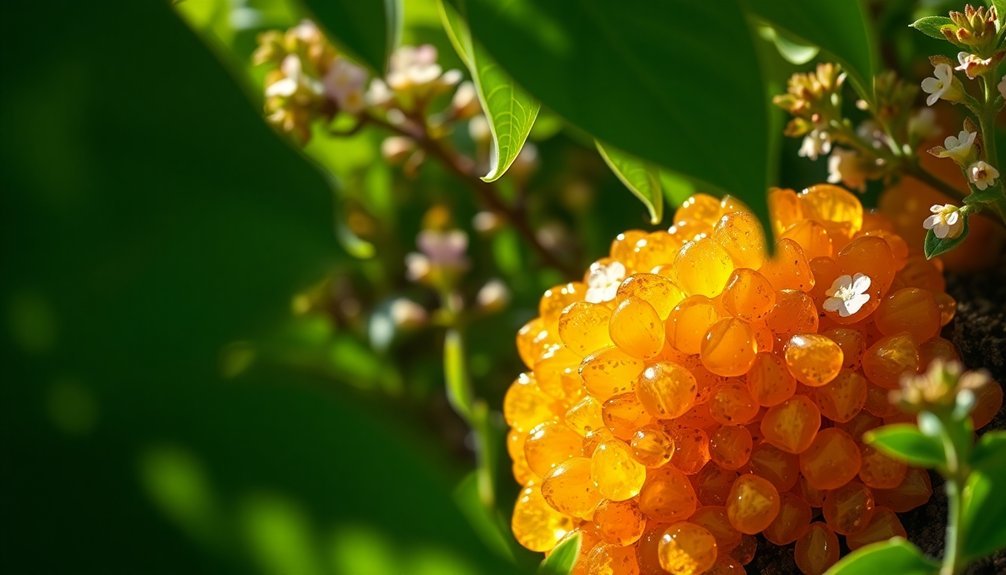
Nature's Mediterranean gem, labdanum offers a rich tapestry of warm, balsamic notes that perfectly mimic musk's sensual characteristics.
You'll discover a complex blend of amber, leather, and woody undertones, enhanced by subtle hints of vanilla and honey. In ancient times, shepherds gathered resin by carefully combing it from goats' fleece where it naturally collected. Its versatile composition, rich in terpenes and aromatic compounds, makes it an excellent fixative in your natural fragrance creations.
- Combines sweet, musky notes with sophisticated woody accents
- Contains natural vanillin and coumarin for added sweetness
- Provides antibacterial and antiviral benefits in skincare
- Blends exceptionally well with other essential oils
- Carries centuries of use in traditional medicine and religious ceremonies
Whether you're crafting perfumes or seeking therapeutic benefits, labdanum's deep, resinous profile delivers both aromatic pleasure and healing properties, making it a valuable addition to your natural ingredient collection.
Costus Root: The Ancient Musk Bearer
Moving from the Mediterranean to the Himalayas, we encounter another remarkable musk substitute: costus root. Harvested from Dolomiaea costus, this ancient perfumery ingredient thrives at elevations between 2,500-3,000 meters, producing stout roots packed with aromatic compounds.
You'll recognize costus by its warm, musky, and earthy profile, with distinct notes of unripe melon and woody undertones. In perfumery, it's a powerful fixative that adds body to Oriental bases and chypres. Be cautious though – its potency can overwhelm in high concentrations.
While historically significant in religious rituals and traditional medicine, costus root is now critically endangered. If you're sourcing this ingredient, verify it comes with proper CITES documentation, as conservation efforts strictly regulate its trade to protect remaining wild populations.
Musk Mallow: The Gentle Botanical Musk
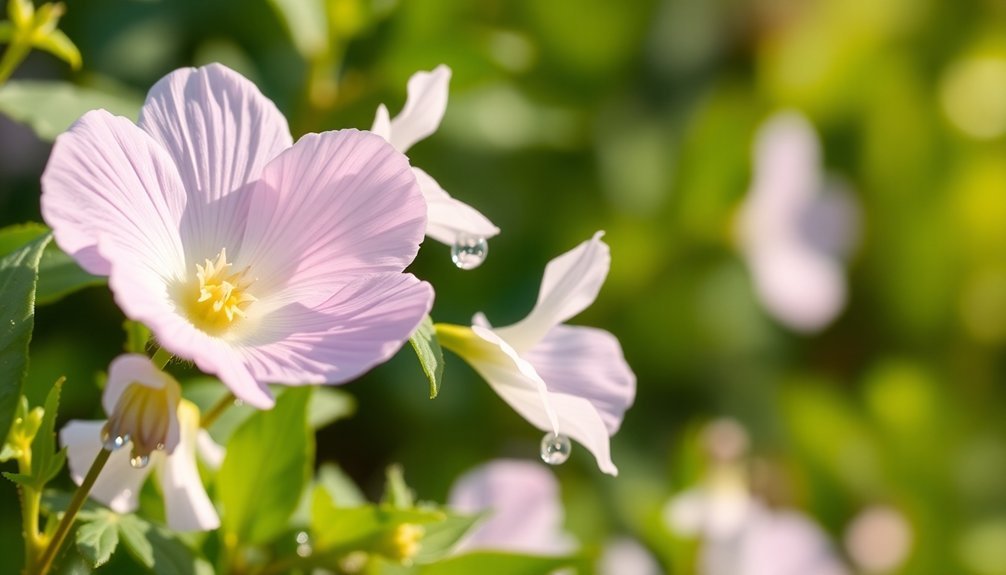
The versatile musk mallow offers a gentle alternative to traditional animal musks through two distinct botanical sources: Malva moschata and Hibiscus abelmoschus.
You'll find Malva moschata's edible flowers and leaves packed with vitamins and minerals, while Hibiscus abelmoschus seeds deliver that coveted musky fragrance for perfumery.
When you're exploring natural musk ingredients, these plants offer multiple benefits:
- CO2-extracted ambrette seeds provide a rich, tobacco-like musk scent
- Malva flowers and leaves can heal skin irritations and ease respiratory issues
- Both plants are sustainable and vegan-friendly alternatives
- You can add the edible parts to salads, soups, and desserts
- The aromatic profile blends beautifully with sandalwood, vetiver, and patchouli
Frequently Asked Questions
How Long Does Natural Musk Retain Its Scent When Stored Properly?
When you store natural musk properly at 4-8°C in airtight glass containers, it'll retain its scent for about three years. However, rare animal musk variants can keep their fragrance for several decades with minimal changes.
Can Natural Musk Ingredients Trigger Allergic Reactions in Sensitive Individuals?
Yes, you can experience allergic reactions to natural musk, including skin irritation, rashes, and respiratory issues. While these reactions are less common than with synthetic musks, it's wise to patch test first.
What Temperature Should Botanical Musk Alternatives Be Stored At?
You'll want to store your botanical musk alternatives in a cool environment, but there's no specific temperature stated. Just avoid high heat, which can degrade the quality and musky aroma over time.
Do Natural Musk Ingredients Work Effectively in Oil-Based or Water-Based Formulations?
You'll find natural musk works best in oil-based formulations due to its lipophilic nature. While it contains some water-soluble components, you'll need special emulsifiers to effectively use it in water-based products.
How Do Different Climates Affect the Potency of Botanical Musk Ingredients?
You'll find warmer climates produce more potent botanical musks due to higher oil concentrations, while cooler regions yield milder scents. Temperature, moisture, and soil conditions directly impact the strength of these ingredients.
In Summary
Whether you're crafting your own scents or exploring natural fragrances, these five botanical musks offer incredible alternatives to synthetic ingredients. You'll find each one brings its own unique character, from Ambrette's powdery notes to Costus Root's intense earthiness. Start small, experiment with combinations, and you'll discover how these natural musks can transform your fragrance journey into something truly personal and extraordinary.
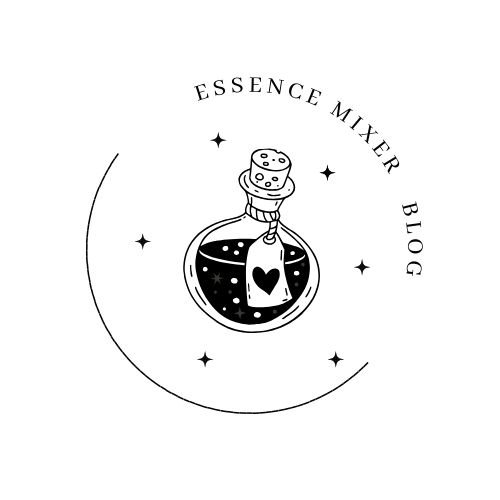
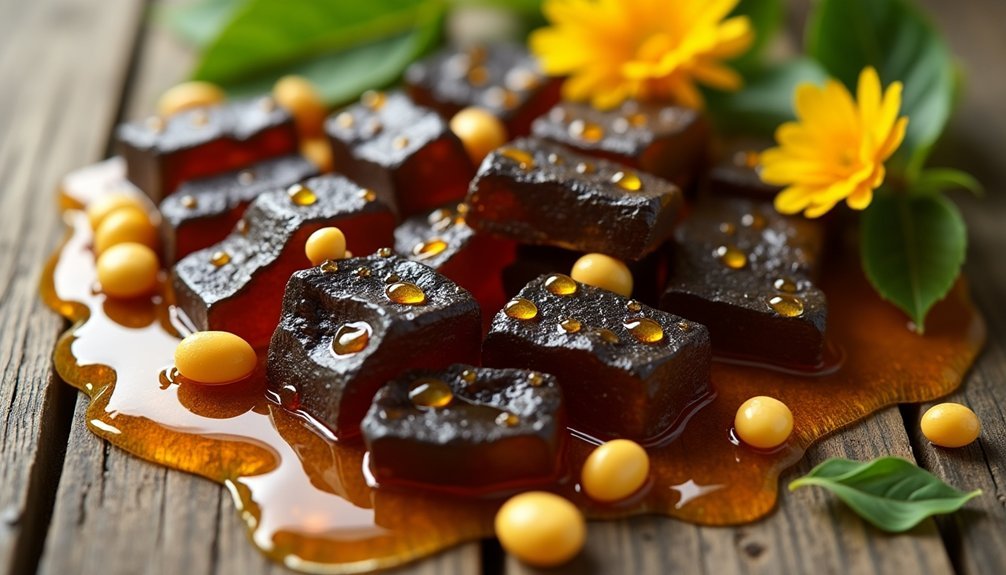



Leave a Reply